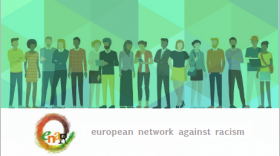No progress in curbing racial discrimination in the European labour market – in particular for women of colour

The report, released on International Day Against Racism, explores racism and discrimination in employment in 23 EU countries in the last five years. Little has changed since ENAR’s last 2012-13 report on racial discrimination in employment, which had already pointed to persistent discrimination faced by ethnic and religious minorities in the labour market. Not only is there is a lack of enforcement and awareness of existing anti-discrimination laws, but some laws and policies limit migrants’ access to the labour market.
Ethnic and religious minorities have fewer chances of getting through recruitment processes. In Belgium, research showed that job applicants with foreign sounding names have 30% less chances of being invited to a job interview compared to applicants with a similar profile but Flemish sounding names. In Hungary, one in two Roma said they had suffered discrimination when seeking employment. Discriminatory recruitment practices and structural inequalities also mean that migrants and ethnic minorities tend to have a higher unemployment rate and to be overrepresented in certain job positions or sectors, in particular agriculture, services and care.
Once in a job, ethnic minorities and migrants face additional obstacles, including racist incidents in the workplace, wage disparities, job insecurity and in the worst cases, exploitation and difficult working conditions. In Ireland, a large proportion of racist incidents reported is in the workplace (31%). In Germany, the monthly income of people of African descent was almost 25% less than the national mean monthly net income. In Italy and Greece, migrant workers face inhuman and exploitative working conditions, in particular in the agriculture sector.
Women of colour in Europe face multiple obstacles in the labour market: they are particularly vulnerable to discrimination, exploitation, sexual harassment and mistreatment, experience high rates of overqualification, as well as segregation in specific sectors, in particular, domestic work. In France, women with an African background have the lowest labour market activity rate. In Cyprus, the majority of female migrant domestic workers are subjected to multiple discrimination, unequal, unfair and abusive treatment, violence and/or sexual abuse. In Belgium, 50% of discrimination complaints by women on the ground of religion (Islam) received by the equality body in 2014 concerned employment.
Read the full story on ENAR’s website. Help us build the most comprehensive directory of organizations that support black women across Europe bu sending in the names of the groups you know to contact@bwiesmg.org. Thank you.


